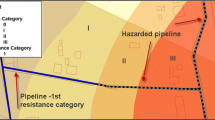Abstract
Recurrent incidences of pipeline failure bring about serious physical, economical, and environmental consequences. Therefore, developing pragmatic approaches to model the water distribution infrastructure is crucial for preserving these assets. The objective of this paper is to develop a pipe failure prediction model grounded in fuzzy inference system and the probability of failure analysis to estimate the rate of failure in water infrastructure. First, the attributes that contribute to water pipelines deterioration are identified. Second, the fuzzy logic engine is designed to simulate the defined codes and functions. Third, probability of failure schemes are generated to address the uncertainties and predict the risk associated with water pipes’ failure. The developed model was applied to the water network of the city of El Pedregal in Peru. This paper developed an automated tool, expected to improve the quality of decision making, as it can assist water utility managers and infrastructure engineers in optimizing their future plans.
Access this chapter
Tax calculation will be finalised at checkout
Purchases are for personal use only
Similar content being viewed by others
References
ASCE (2017) Infrastructure report card. https://www.infrastructurereportcard.org/cat-item/drinking_water/
AWWA (American Water Works Association) (2012) Buried no longer: confronting america’s water infrastructure challenge. http://www.urbanwaterslearningnetwork.org/resources/awwa-confronting-americas-water-infrastructure-challenge2017/
Campanella K, Andreasen C, Diba A, Himmelberger H, Leighton J, Santini J, Vause K (2016) 2015 establishing the level of progress in utility asset management survey results. Proc Water Environ Fed 2016(1):462–490. https://doi.org/10.2175/193864716821123341
Dawood T, Elwakil E, Novoa HM, Delgado JFG (2019) water pipe failure prediction and risk models: state-of-the-art review. Can J Civ Eng 47(10):1117–1127. https://doi.org/10.1139/cjce-2019-0481
Elwakil E (2011) Knowledge discovery based simulation system in construction (Doctoral dissertation, Concordia University)
Elwakil E, Zayed T (2015) construction knowledge discovery system using fuzzy approach. Can J Civ Eng 42(1):22–32. https://doi.org/10.1139/cjce-2014-0153
Esragh F, Mamdani EH (1979) a general approach to linguistic approximation. Int J Man Mach Stud 11(4):501–519
Fayaz M, Ullah I, Kim D.-H (2018) Underground risk index assessment and prediction using a simplified hierarchical fuzzy logic model and Kalman filter. Processes, 6(103). https://doi.org/10.3390/pr6080103
Harvey R, McBean EA, Gharabaghi B (2014) Predicting the timing of water main failure using artificial neural networks. J Water Resour Plan Manag 140(4):425–434. https://doi.org/10.1061/(ASCE)WR.1943-5452.0000354
Jang J-SR, Sun C-T, Mizutani E (1997) Neuro-fuzzy and soft computing: a computational approach to learning and machine intelligence. Prentice Hall, NJ, USA
Kleiner Y, Sadiq R, Rajani B (2004) Modeling failure risk in buried pipes using fuzzy Markov deterioration. Pipeline Div Spec Congress, ASCE, San Diego, California, USA. https://doi.org/10.1061/40745(146)7
Li D, Yao W (2016) Risk assessment of long-distance water transmission pipeline based on fuzzy similarity evaluation approach. In: 12th international conference on natural computation, fuzzy systems and knowledge discovery (ICNC-FSKD), Changsha, China. https://ieeexplore.ieee.org/abstract/document/7603331
Malinowska AA (2017) Fuzzy inference-based approach to the mining-induced pipeline failure estimation. Nat Hazards 85:621–636. https://doi.org/10.1007/s11069-016-2594-4
Rajani B, Kleiner Y, Sadiq R (2006) Translation of pipe inspection results into condition ratings using the fuzzy synthetic evaluation technique. Int J Water Supply Res Technol Aqua 55(1):11–24
Ricci PF, Sagen LA, Whipple CG (1981) Technological risk assessment series E, applied series no 81, NATO ASI Series, Erice (Italy)
Sadiq R, Kleiner Y, Rajani BB (2004) Fuzzy cognitive maps for decision support to maintain water quality in ageing water mains. In: 4th international conference on decision-making in urban and civil engineering, Porto, Portugal, pp 1–10
Sadiq R, Kleiner Y, Rajani B (2007) Water quality failures in distribution networks—risk analysis using fuzzy logic and evidential reasoning. Risk Anal 27(5). https://doi.org/10.1111/j.15396924.2007.00972.x
Snider B, McBean EA (2020) Improving urban water security through pipe-break prediction models: machine learning or survival analysis. J Environ Eng 146(3):04019129
Acknowledgements
This work is supported by the collaboration of the Universidad Nacional de San Agustín (UNSA) in Arequipa, Peru, and Purdue University in Indiana, USA through Discovery Park’s Center for the Environment (C4E).
Author information
Authors and Affiliations
Corresponding author
Editor information
Editors and Affiliations
Rights and permissions
Copyright information
© 2023 Canadian Society for Civil Engineering
About this paper
Cite this paper
Dawood, T., Elwakil, E., Novoa, H.M., Delgado, J.F.G. (2023). Prediction of Water Pipe Failure Using Fuzzy Inference System. In: Walbridge, S., et al. Proceedings of the Canadian Society of Civil Engineering Annual Conference 2021 . CSCE 2021. Lecture Notes in Civil Engineering, vol 241. Springer, Singapore. https://doi.org/10.1007/978-981-19-0511-7_14
Download citation
DOI: https://doi.org/10.1007/978-981-19-0511-7_14
Published:
Publisher Name: Springer, Singapore
Print ISBN: 978-981-19-0510-0
Online ISBN: 978-981-19-0511-7
eBook Packages: EngineeringEngineering (R0)




